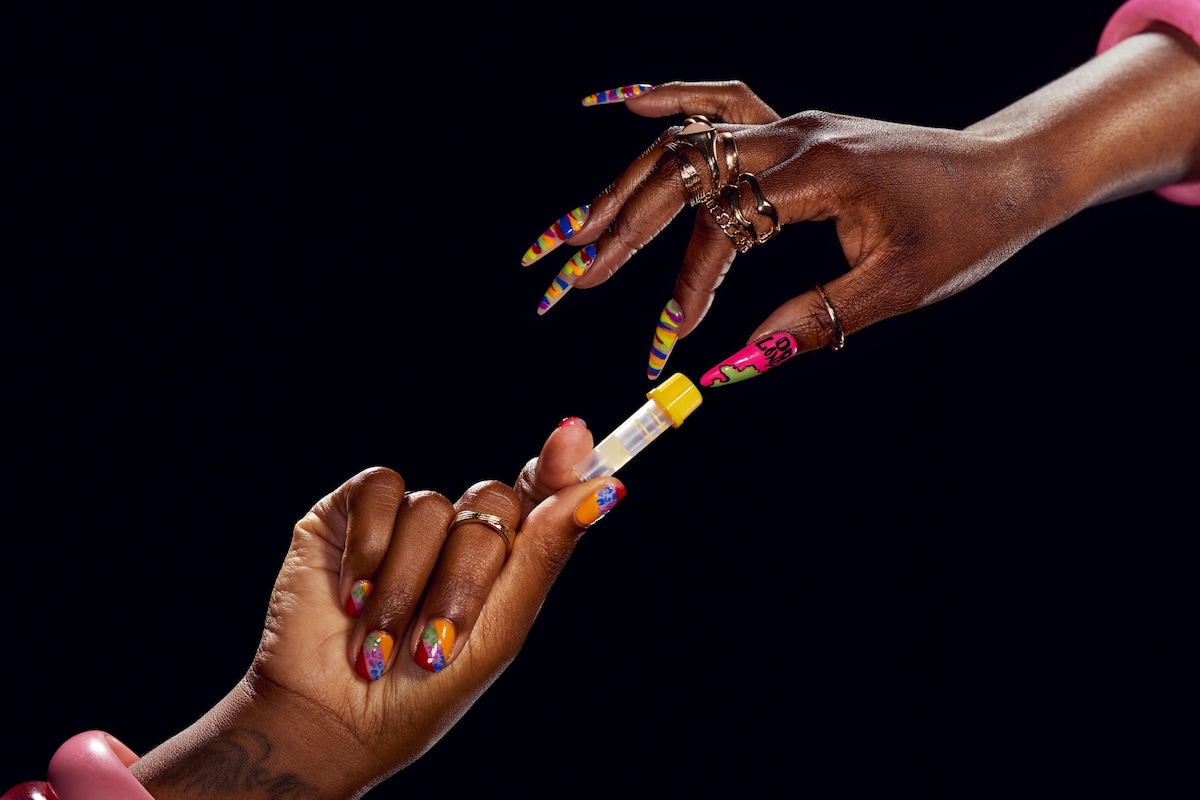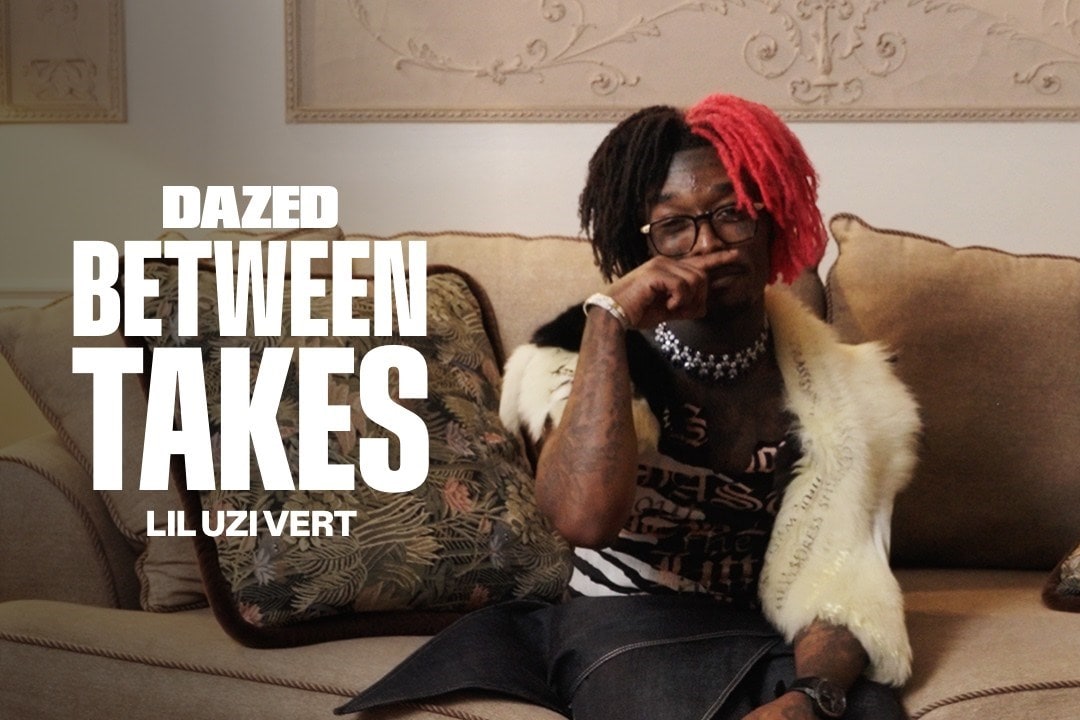A quarter of women in London consider getting their nails done to be an important part of their physical or emotional wellbeing, according to new research from the London HIV Prevention Programme (LHPP). However, only four per cent feel the same about getting tested for HIV. It’s no surprise that going to a nail salon is considered more fun than a visit to the GUM clinic, which is no one’s idea of a self-indulgent treat day, but what if you could combine the two? This Thursday (August 21), ahead of Carnival weekend, a new pop-up nail bar is offering free manicures and nail designs alongside information about HIV and access to testing.
Launching at Peckham Palms, a Black-owned business hub in South London, Tips and Test is a collaboration between LHPP and Zults, an app which makes it easier and less awkward to share results from sexual health tests. It forms part of Do It London, a wider campaign which aims to raise awareness about the benefits of regular testing and to help end new HIV transmissions by 2030. Shei Osei, a British-Jamaican nail artist who designed Cynthia Erivo’s nails for Wicked, as well as having worked with a slate of other major names (and Dazed Beauty), has created three colourful new designs which celebrate the culture of Notting Hill Carnival. During the appointment, attendees can have an informal chat about HIV with their nail technician and sign up for a free at-home testing kit. “As a nail artist, I get to spend a lot of time up close with my clients – we end up having real-world chats about life. We almost become pals, so chatting about something as important as HIV testing just comes easily,” Osei says.
While everyone is welcome at Tips and Test, it is particularly aimed at encouraging conversations among Black women. “HIV continues to have a disproportionate impact on women, who made up over a third of new diagnoses in the past year, and Black African populations make up the second largest group impacted by HIV in this country,” Marc Thompson, lead commissioner of LHPP and a sexual health campaigner with decades of experience, tells Dazed. According to the most recent figures, new diagnoses of HIV are increasing most sharply among heterosexual men and women, who are less likely than gay or bisexual men to be regularly testing or taking PrEP (a highly effective preventative treatment).
The changing demographic nature of HIV in Britain is largely the result of persistent racial health inequalities. “It’s important to state that this isn’t due to anything that Black women or women are doing; it’s not about behaviour; it’s not as if these women are having more sex or taking more risks,” Thompson says. “Globally, 50 per cent of people diagnosed with HIV are women and girls, so it should be no surprise that we see a similar issue happening here.”
Black women, in particular, face significant barriers to accessing healthcare. “We know that people from Black communities have poor health outcomes across a number of different conditions, and as we saw during the Covid pandemic, that has a lot to do with institutional and systemic racism,” says Thompson. There is evidence that women, and particularly women of colour, are not being offered PrEP at medical appointments, based on outdated assumptions about what their needs are. Evidence shows that racism and cultural discrimination are still prevalent in the NHS, which affects both the quality of care which people receive and puts them off engaging with services in the first place. “More generally, the way our sexual health services are set up isn’t always easily accessible,” says Thompson. “If you are a young gay man in London, you can probably pop into Dean Street [a sexual health clinic in Soho] and get a PrEP appointment. If you’re a woman who has children or a more complex lifestyle, it might be much more difficult for you to get to a clinic.”
While race is an issue in itself, migrants face a different set of challenges from born-and-bred Londoners. If someone doesn’t speak English as a first language, for example, they might also struggle to access services which are only available in English.
Adding to the problems above, says Thompson, is a lack of awareness around HIV and who it affects. “This isn’t really a conversation that people are having in our communities. A lot of people don’t know that the rates of HIV are so high, and that might be informing the preventions they’re taking,” he says. Uptake of PrEP has been high among gay, bisexual and other men who have sex with men, but there are still lots of people who don’t realise that they might benefit from taking it, or simply don’t realise it’s an option. For Thompson, one important message to get across is that PrEP can be empowering for women. “Like the contraceptive pill, this is something which gives you control over your own body,” he says.
While there has been progress made over the last decades, HIV remains a stigmatised condition, which complicates the kind of outreach work Thompson is doing. “One thing that’s come out strongly [in our research] is that communities don’t want to be stigmatised by being labelled as ‘the community that has more HIV.’ So we need to be really careful and nuanced that we’re not stigmatising people even more than they already are,” he says. This is a tricky balance to strike, but it starts by being honest. “We have to be very clear and transparent [about rates of HIV]. We’re not just making this up – the evidence is very clearly there,” he says. “The second thing we need to do is work closely with communities and enable them to tell us what they need. It’s a ‘nothing for us without us’ approach.”
As LHPP’s research shows, people want to access services like HIV testing in their own community spaces. “We know that this model has worked previously with gay, bisexual and other men who have sex with men, because there’s a long history of outreach in those communities. We also know that models like this have been tried with men in barber shops, particularly around prostate cancer and mental health awareness,” Thompson says. “What we want to do now is to amplify the excellent work that is already happening and to find new and interesting spaces where we can address the issue. So how do we work with Black businesses? How do we work in social spaces where younger Black people may be going? To reach Black heritage communities, we have to be creative, we have to be innovative, and we have to work directly with the community, so they can tell us how and where we can be most effective.”
‘Tips and Test’ is now sold out, but there will be walk-in appointments on the day on a first-come-first-serve basis. You can order a free at-home HIV testing kit through Sexual Health London.



